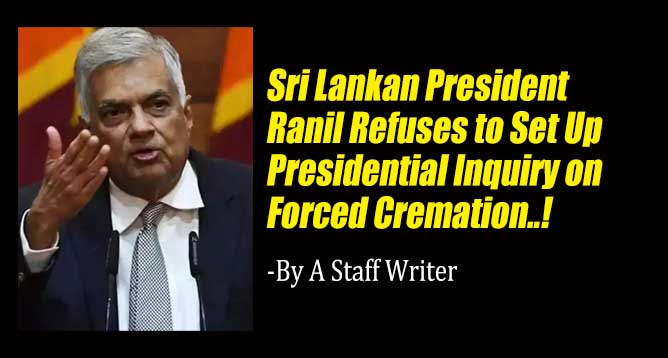-By A Staff Writer

(Lanka-e-News -11.July.2024, 11.20 PM) In a move that has sparked widespread controversy, President Ranil Wickremesinghe has declined to establish a Presidential Commission to investigate the forced cremation of Muslim and Christian COVID-19 victims. This policy, enforced during the presidency of Gotabaya Rajapaksa in 2020 and 2021, faced significant criticism for violating religious beliefs and customs.
The Sri Lankan government, under Rajapaksa, mandated the cremation of all COVID-19 victims, arguing that burials could potentially contaminate groundwater. This assertion was reportedly based on the advice of an expert committee, whose composition and qualifications remain undisclosed. The policy drew sharp condemnation from UN experts and Muslim-majority countries, who saw it as an infringement on religious rights.
Critics have pointed out that Ranil Wickremesinghe, appointed to power with the support of the Rajapaksa family, appears to be siding with the Sri Lanka Podujana Peramuna (SLPP) party, which has been accused of promoting an anti-Muslim agenda. Calls for a thorough investigation into the government's decision-making process and the Supreme Court's dismissal of related cases have been persistent but unmet.
Political, religious, and community leaders from the Muslim community have repeatedly urged the government to reconsider the "cremate only" policy. They have highlighted that more than 190 countries allow burials and that the World Health Organization has advised that burials pose no risk of contaminating water supplies.
Despite these appeals, the Sri Lankan Supreme Court has dismissed several cases challenging the cremation policy without providing explanations. This has raised questions about the transparency and fairness of the judiciary's decisions.
World-renowned virologist Professor Malik Peiris has also criticized the government's stance. "COVID-19 is not a waterborne disease," Prof. Peiris told the BBC. "There is no evidence to suggest it spreads through dead bodies. A virus can only multiply in a living cell, and once a person dies, the ability of the virus to multiply decreases."
He further elaborated, "Dead bodies aren't buried right in running water. Once you bury the body six feet under, wrapped in impermeable wrapping, it is highly unlikely it would contaminate running water."
The controversy also extends to current Foreign Minister Ali Sabry, who has been accused of misleading the international Muslim community with false information and covertly supporting the forced cremation policy to maintain his cabinet position. These allegations have only fueled demands for a transparent inquiry.
As pressure mounts from both domestic and international fronts, the refusal to appoint a Presidential Commission leaves many questions unanswered and continues to strain communal relations in Sri Lanka. The affected communities and their leaders remain steadfast in their call for justice and the restoration of their religious rights.
---------------------------
by (2024-07-11 19:30:31)
Leave a Reply